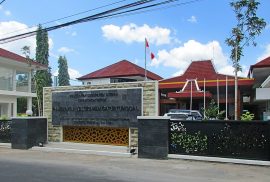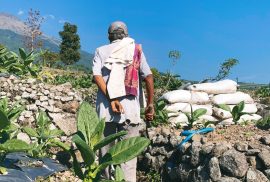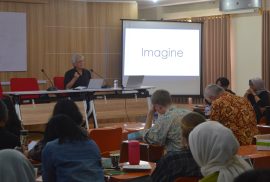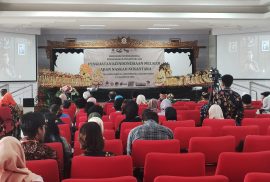Technological advances, especially in the world of social networking, can indirectly influence language use when interacting with interlocutors. Interacting via social media also uses language. Politeness in language is an important thing that speakers can use in communicating so that the person they are talking to does not feel pressured, cornered or offended. Politeness is also needed in responding to news. Thousands and even millions of news are circulating on social media. Not all of the news is true. There is also fake news or hoaxes. This fake news will target all groups, including mothers. Mothers are a group of people who are vulnerable to information. The Master of Linguistics Study Program at the Faculty of Cultural Sciences, apart from teaching and developing language knowledge, is also committed to educating the public in language on social media, especially language politeness in responding to fake news. For this reason, community service activities in 2023 are focused on responding to fake news on social media in the women’s environment of Caturtunggal and Terban Districts.
SDG 11
Tobacco is a very promising plantation commodity. In the form of cigarette excise, tobacco contributes more than 100 trillion rupiah in national income. However, the welfare of tobacco farmers as producers of cigarette raw materials is not proportional to their contribution. Despite this, farmers continue to farm tobacco despite the availability of other alternative agricultural commodities. In Temanggung Regency, which is nicknamed the Tobacco City, the situation is not much different. Local farmers have the opposite perception of tobacco. Among the local community, myths circulate that tobacco can bring high welfare to farmers, so it is called “green gold”, the plant of the “saints”, and various ritual practices such as ngalap berkah (seeking blessings) in the process of planting and processing tobacco.
Starting from this social phenomenon, the UGM Student Creativity Programme (PKM) team in the field of Social Humanities Research consisting of Abdila (History 2020), Wahyu Lestariningsih (Cultural Anthropology 2020), Devina Savana Putri (Economics 2021), and Ana Fitro Tunnisa (Social Development and Welfare (2022) accompanied by Dr Hempri Suyatna, S.Sos., M.Si conducted research with the title “Between Poverty and Ngalap Berkah Myth: Contradictions in Perceptions of Welfare of Temanggung Tobacco Farmers.” To obtain data, the team conducted in-depth observations and interviews in Tlogomulyo Sub-district, Temanggung Regency, Central Java in two months, July and September 2023. The team also conducted historical data research, and social welfare data research at BPS and the Temanggung District Social Service, and completed a secondary literature review.
By combining ethnographic and historical approaches, it was found that the middlemen’s entrapment and the involvement of the Chinese in the region are a vital part of the formation of tobacco myths, such as those about Ki Ageng Makukuhan and Saudagar Dampu Awang who are well well-known (and even sacred) among local farmers. The team also found that farmers form an inverse perception of the reality of the tobacco economy. There are several unfavourable conditions in the tobacco economy including the unpredictable selling price of tobacco, the strong dependence on extreme weather to produce good tobacco and avoid crop failure, the cessation of fertiliser subsidies due to tobacco policy, and unhealthy capital with middlemen at 50% interest rate known as nglimolasi system (borrow 10 pay 15). However, farmers continue to grow tobacco hoping for abundant sustenance at the beginning of each planting year, pinning their hopes for life and the future of their children and grandchildren on tobacco, and showing an emotional-spiritual connection to tobacco that tobacco is more than just a commodity.
As a plant of the saints, tobacco is also a blessing so farmers’ steadfastness in all economic conditions and continuing to cultivate tobacco and treat tobacco with its own speciality is part of the spiritual-emotional attachment in an effort to seek blessings. In this behaviour, the team found three dimensions of the subjective well-being of Temanggung tobacco farmers, including the harmony dimension, the social relationship dimension, and the environmental dimension. The harmony dimension is obtained when, for example, farmers work together in traditional ceremonies. The social relationship dimension is fulfilled by the feeling of happiness when they can help each other during picking season, as well as the attitude of solidarity among fellow farmers to fight for common welfare in the tobacco trade during harvest season.
The subjective welfare of the environmental dimension, for example, is the belief that welfare comes from the environment, namely in the form of fertile land, as well as the belief that natural elements are considered as living entities that are more than humans, thus forming the culture of selamatan ceremonies for the earth. Although material/economic welfare has various obstacles, Temanggung tobacco farmers have another source of welfare, namely subjective welfare that creates happiness for tobacco farmers and resistance to various challenges.
Writer: Abdila (History 2020) and Devina (Economics 2021)
The Department of History at Universitas Gadjah Mada (UGM) recently hosted its annual Summer School, which was a significant achievement after last year’s event had to be held virtually due to the pandemic. This year, the Department of History organized the 1st Summer School on Environmental History in Indonesia, a timely and important topic given the current global focus on environmental issues. The Summer School was held offline for the first time since the pandemic, from 31 July to 7 August 2023.
The event was inaugurated by the Head of the Department of History, Dr Abdul Wahid, who delivered a welcome address to the participants. Following Dr Wahid’s remarks, Dr Farabi Fakih provided opening remarks that set the tone for the week-long program.
This year’s Summer School has a theme that is very close to Indonesian society, especially in a post-pandemic world that is increasingly loudly voicing issues regarding the environment. In collaboration with WALHI and BKI Journal / KITLV, this activity invited thirteen speakers from renowned universities and institutions. The universities and institutions involved included the University of Queensland, Universiteit Leiden, National University of Singapore, FIAN Indonesia/ Samdhana Institute, WALHI/Friends of the Earth Indonesia and of course several speakers from Gadjah Mada University.
The summer school programme was a diverse and enriching experience, with participants hailing from various countries and fields of study. Notably, attendees came from Germany, Singapore, and Indonesia. The programme was structured with both in-class and out-of-class activities. Within the classroom, participants engaged in stimulating discussions with speakers over a period of four days. Outside the classroom, the group embarked on field trips to a number of fascinating locations, including Siung Beach, Watukodok Beach, Al Imdad Islamic Boarding School, and Kali Code Garden. This well-rounded and immersive experience allowed participants to broaden their perspectives and gain valuable insights into different cultures and fields of study.
The summer school event was closed with project presentations from each group on 6 August 2022. Some discussions also took place quite intensely. In the end, the summer school participants managed to complete the series of activities well and optimally.
The success of this summer school event certainly cannot be separated from the committee who worked both in front and behind the scenes. The committee from the Department of History UGM is composed of a combination of teaching staff, education staff, alumni, and several undergraduate students.
Globalization has brought both positive and negative impacts on Indonesia. While it offers an abundance of information, it also poses challenges to the preservation of national cultural values such as manners. This concern led to the organization of the 19th Nusantara Manuscript International Symposium titled “Strengthening Indonesianness Through Nusantara Manuscript Studies” by MANASSA and the Faculty of Cultural Sciences of Gadjah Mada. The symposium aimed to address the importance of studying Nusantara manuscripts in reinforcing the country’s identity and cultural values.
The Nusantara Manuscript International Symposium (SIPN) is an annual event that has been organized by the Nusantara Manuscript Society (Manassa). The primary objective of this event is to provide a platform for both domestic and international scholars to delve into the latest findings in the field of Indonesian manuscripts. Dr Munawar Holil, S.S., M.Hum., the Chairman of Manassa, expressed in the opening ceremony of the XIX International Symposium of Nusantara Manuscripts (SIPN) that the symposium attracts researchers of various levels, from juniors to seniors, and serves as an ideal venue for the sharing of knowledge and experiences. Varies from various levels of expertise, from juniors to seniors, and serves as an ideal venue for the sharing of knowledge and experiences.
This year’s International Symposium on Nusantara Manuscripts will be held offline and online for two days on 7-8 August at the Faculty of Cultural Sciences UGM. The 19th Nusantara Manuscripts International Symposium, entitled “Strengthening Indonesianness through Nusantara Manuscript Studies”, is expected to reinforce the role and function of Nusantara manuscripts as a national identity amidst the current globalisation.
The symposium is divided into eight discussion panels: (1) Cross-Cultural Phenomenon in Nusantara Manuscripts; (2) Digital Humanities and Nusantara Manuscript Studies; (3) Nature and Nusantara Manuscripts; (4) Ethnoscience for Nusantara Manuscript Studies; (5) Nusantara Manuscript Studies and Sustainable Development Issues; (6) Preservation and Conservation of Nusantara Manuscripts; (7) Reportage, Rumours, and Hoaxes in Nusantara Manuscripts; (8) Nusantara Manuscripts and Creative Industries.
Further information about SIPN XIX can be found at http://www.manassa.id.





